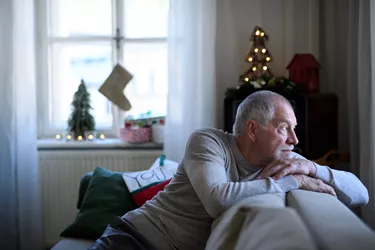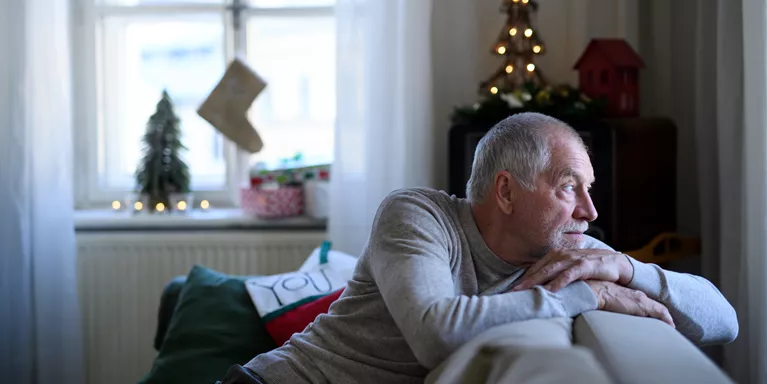Accessing NHS services in a crisis
Simon tells us about his experiences accessing NHS services when he was going through a mental health crisis.
At half past eight one Thursday morning I snapped. I’d been arguing with my wife and I was about to leave for work. I went to put my shoes on as I cried that I’d had enough - I wanted to die. My voice broke and I was hardly able to speak. I turned around and headed back to the living room sofa via the kitchen, sat down next to my wife and self-harmed.
I did not manage to seriously injure myself because my wife stopped me and held me on the floor. She kissed me but I was too numb to respond. I felt no physical pain. I had achieved one thing: I had released the pain inside me.
"I could have just tidied myself up and gone to work but somehow I knew I had to speak to a doctor."
I decided that I had to see a doctor. I left on my own to go to hospital, calling the 111 service from my car. I was assessed over the phone and advised to call my GP. I told the receptionist at my surgery I had an injury and she immediately advised me to go to the walk-in centre at the local hospital. Was I in the right state of mind to drive there on my own? On reflection, no. But I made it to the centre, parked my car (I later discovered I had damaged the front of the car when I parked), and walked up to the reception desk. I felt surprisingly calm and eerily not sure what I was doing. I could have just tidied myself up and gone to work but somehow I knew I had to speak to a doctor.
I showed the woman at reception my injury and she kindly suggested I had had a kitchen accident; it was comical but easier to just agree. I sat down and waited for the nurse to call me. Conscious of the time, I became anxious that I had meetings at work and called my manager. As I attempted to speak to her I broke down in tears, unable to articulate what I’d done. I managed to throw out a few words so she understood I was in hospital and had an injury. Then the nurse called me. I took a deep breath and broke down again as I attempted to explain that I’d harmed myself. The nurse was somewhat shocked as she took in my present mental state, but was really kind and caring towards me. She made an appointment for me to go to A&E at the local hospital and looked after until it was time to go. She forbid me to drive and walked me to the bus stop. She even called the local Tesco where my car was parked to ensure it was safe.
The visit to A & E the nurse had explained to me, was to talk to a psychiatrist. I was still processing what this meant for me.
At A&E I was taken by a triage nurse to a private room and broke down again as I explained what I had done. He was sympathetic and informed me that I would not be left alone. We went to the main A&E and I was given a bed. I sat there, with superficial wounds, whilst other beds had elderly people and others with serious injuries, and reflected on how I had come to be there. As I contemplated what I had done to myself I simply could not grasp it. Maybe I was in shock.
"As I sat there talking to the psychiatrist I began to understand I was in A&E because I was a risk to myself."
Eventually a psychiatrist came and spoke to me. I broke down as I recalled what I had done. I explained how I had no sense of killing myself, and how anxious I was that if I went back into that stressful state I was capable of harming myself again to relieve the pain inside me. Deep inside I felt the sorrow of not being the person I once was. I felt afraid of what I had become and not being able to stand back, see the risk involved and rationalise it.
As I sat there talking to the psychiatrist, slowly, painfully and carefully, thinking about my answers to his questions, describing what had happened, articulating how I had lost myself, I began to understand I was in A&E because I was a risk to myself. It was the responsibility of the doctor to keep me safe from harm, from myself.
The psychiatrist took me through two tests, one for depression and the other for anxiety. Perhaps I was still processing what had happened but it was very difficult for me to capture where I was in relation to the tests. He told me that I had acute anxiety and severe depression (or the other way round - I can’t remember).
The psychiatrist then had to make a decision about keeping me safe from harm. He had challenged me many times during our chat as I’d given him esoteric answers, and questioned whether I should be released. I was very nearly made an in-patient for my own safety, but I didn’t want to be in hospital. I wanted to get better at home. The psychiatrist challenged me on this as it was at home that I harmed myself. Eventually he agreed to discharge me to receive home treatment, but only if I stayed with relatives. A nurse would be coming to see me every day - I was going to be monitored closely.
"It was good to know I had someone to talk to or a place to go to if at any time I thought I was losing control again."
I met with a nurse from the home treatment service who listened patiently while I explained to her what had happened and broke down again. Facing what I had done to myself was too raw. The nurse gave me information on numbers I could call and a safe haven I could visit. This was valuable to me, even though I thankfully did not need to use them. It was good to know I had someone to talk to or a place to go to if at any time I thought I was losing control again. I left the hospital eight hours after I had originally left home.
I am indebted to the doctors and nurses for treating me with genuine respect and putting me on the road to recovery. With counselling and daily monitoring by the Hospital Treatment Team I have been able to move to the Community Mental Health Team. This has given me the sense of having a lifeboat should I need it. Surrounded by a cacophony of daily life stresses I feel ‘listened to’. The long road to recovery is littered with potholes – facing reality, adapting back into work and dealing with conflict – but however it long it takes, I have the basic confidence that I am facing in the right direction.


Information and support
When you’re living with a mental health problem, or supporting someone who is, having access to the right information - about a condition, treatment options, or practical issues - is vital. Visit our information pages to find out more.
Share your story with others
Blogs and stories can show that people with mental health problems are cared about, understood and listened to. We can use it to challenge the status quo and change attitudes.

















